When Christians Create Non-Christian Stories
This week I’m talking about The Songweaver’s Vow in Lorehaven Book Clubs.
Some people might be surprised that a Greek myth told among Norse myth was written by a Christian.
Of course the easy out is to say, “C. S. Lewis did it first!” but it remains a legitimate question: How can we enjoy non-Christian story if we are Christians?
This week we feature Laura VanArendonk Baugh and her novel The Songweaver’s Vow in Lorehaven Book Clubs. Stop by the flagship book club on Facebook to learn more about this story.
Subscribe to Lorehaven Magazine for free to download our new summer 2018 issue.
The key is understanding that all truth is truth and is God’s truth, no matter where that truth is found.
For example, I know 300 is fewer than 100,000, and that’s true whether I learn it from Judges 7–8 or a mathematics textbook.
Or: If I don’t get a literary award I want and so I malign the award, it’s accurate to say that I am experiencing “sour grapes,” and an Æsop reference is simpler than a biblical one.
A story need not be found in the Bible to say something truthful about human behavior or the world we occupy.
Consider this parable:
“A traveler crossed a river on a heavy wooden raft. When he reached the other side, he was faced with the dilemma of leaving the raft, which had been invaluable to him, or carrying it on his back as he continued his journey because it had meant so much to his success. He concluded it was wiser to recognize when its use had ended, and he left it at the riverside.”
Isn’t that a great illustration about not valuing material goods or emotional crutches beyond their purpose? Learning that it’s a story from Buddhist tradition does not sap its meaning that we should not continue to cling to or rely on what cannot help us now, a message which also fits well with Christian theology.
This is a long, long way from saying that if a Norse myth can say something true about human nature, it demonstrates the truth of Norse theology, and that conclusion would be a logical fallacy at best. Discernment should be a part of every reading experience, pagan or Christian or atheist or anything.
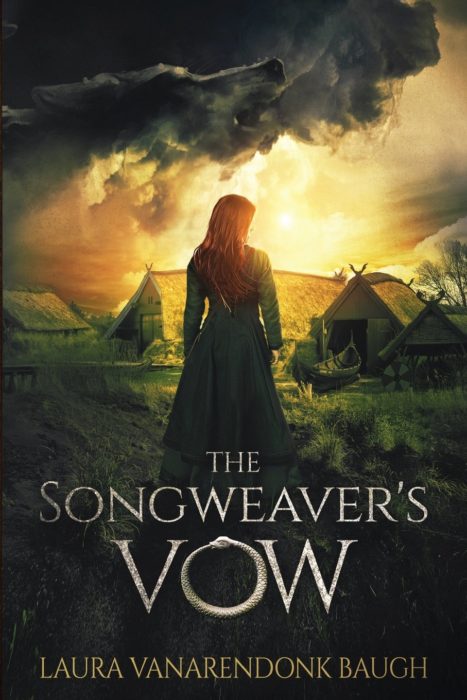
“Laura VanArendonk Baugh masterfully draws on legends and myths both familiar and obscure to create a world that is all too similar to our own.”
— Lorehaven Magazine
Likewise, the argument that referencing pagan myths brings fresh power to the pagan gods is flawed. The fictional trope that deities gain power via human attention is merely that—a fictional trope. It’s important to remember that truth is not affected by whether or not we believe it. Reality does not depend on our opinion of it or attention to it! (One might even argue that by making them fictional characters we emphasize their fictitious nature, a sort of literary children’s breakfast with Jesus and Santa.)
Nor do I think one can reasonably argue that a book like The Songweaver’s Vow is likely to lead readers to modern Ásatrúism or neo-paganism, certainly no more than Till We Have Faces’s far more sympathetic view of the gods is likely to lead someone to worship of Ungit and Istra.
(I did re-read Till We Have Faces before starting The Songweaver’s Vow, and yes, it was nerve-wracking to follow that path! But the fantastic thing about fiction is that there’s always another way to take the story.)
A reader said that The Songweaver’s Vow “feels like a Christian book,” which surprised me. I certainly didn’t write it as an allegory (and it would be a flawed allegory). But I think there are strong themes which should resonate with a Christian worldview, like trusting to follow the instructions of someone you cannot see, redemptive love, and a bride coming to her husband.
Not all stories are Christian stories, in the sense of including a clear message of salvation and characters talking about the God of the Bible. Not all themes and conclusions in stories are true. But the truth found in stories is truth, and a Christian can find and interpret that truth through a Christian worldview.
“Laura VanArendonk Baugh masterfully draws on legends and myths both familiar and obscure to create a world that is all too similar to our own.”
— Lorehaven MagazineExplore Laura VanArendonk Baugh’s award-winning novel The Songweaver’s Vow in the Lorehaven Library.
Read our full review exclusively from the spring 2018 issue of Lorehaven Magazine!




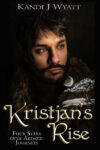



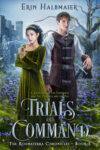

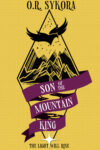













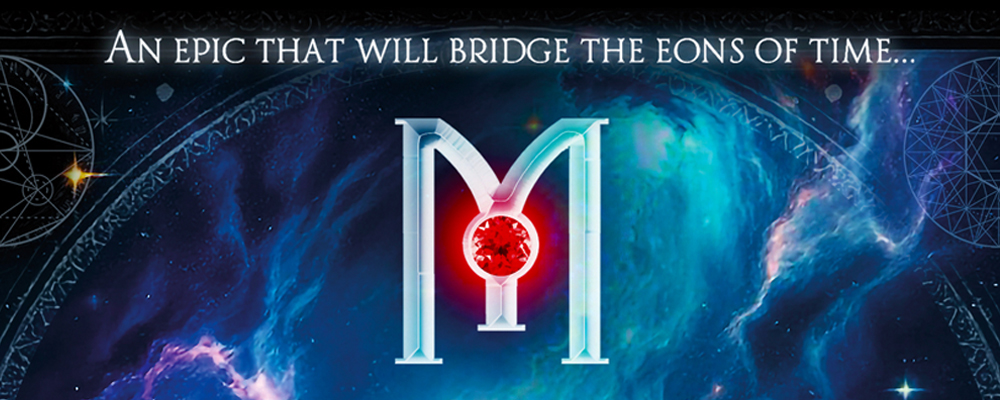

“Some people might be surprised that a Greek myth told among Norse myth was written by a Christian.”
I wanna parse this out, because WHO, exactly, would this be? The stereotypical pearl-clutchers, or people whose experience with Christian subculture is mostly of the bubble-shielded variety created mostly by and for the pearl-clutchers?
But Greek and Norse myth are considered safe in Christian subculture because it’s well-known in the wider culture. Educated people know about Greek and Norse myth, so it makes you sound like A Smart if you know it. It would be the Buddhist stuff that would surprise me more.
Then again, I was raised by children of children of the Depression, so I would actually have a hard time on the take the boat/not take the boat moral because WHAT IF YOU NEEDED IT LATER AND YOUR DUMB BUTT JUST LEFT IT THERE except you’d probably exhaust yourself dragging it around BUT BUT BUT WHAT IF IT WAS USEFUL LATER. Which is why my Pinterest feed is a contradictory mash of DIY and minimalist blogs.
Atheists unfamiliar with what a lot of more moderate Christians think and believe might be surprised. I know some atheists get surprised when they hear Christians willing to believe evolution/take classes on it/discuss it in any positive way. Atheists who have primarily only heard of Harry Potter book burning Christians might be surprised to hear that a Christian might write something mythological/magical.
That’s still relatively few people, despite Ken Ham’s efforts to make everyone else die on that hill with him. But then, the shrillest shriekers garner the most attention.
Ken Ham, but mostly like-minded planners and creatives, helped to build a life-size, professionally exhibited, and artistically excellent Noah’s Ark–themed attraction. How many Noah’s Ark–themed attractions have you built, notleia?
Oh hey, where you been lately? I guess your newest baby (Lorehaven, unless you have a literal baby somewhere we haven’t heard about) has been taking all your time.
I figure there’s a reason Ken Ham had to move to America to profit from his wares rather than in his native Australia. (Artistically excellent, maybe, but deffo evidence deficient and held together with much more wishful thinking than is structurally stable.)
But no matter how much sadface he might make about it, Ken Ham is not in charge of which hill I die on and I’m very much not choosing YEC to die on.
Notleia, I don’t know what your problem is, but you clearly have issues. You seem to enjoy antagonising people. And your views on just about anything seem to regularly to line up with what’s popular amongst unbelievers rather than what’s biblical. Why are you here? What’s your motive?
She’s not always kind about everything, but I personally appreciate that she’s here to have conversations with us even if she disagrees. She might sound a little harsh sometimes, but from what I can tell, she doesn’t mean any harm. This site isn’t necessarily an exclusively Christian club. Even if she was an atheist, that just means she’s willing to talk to us and as a result might come to understand us a little better. Trying to chase her away isn’t necessarily a Christianlike response in this case.
“Not always kind”, “she disagrees”, “might sound a little harsh sometimes”? Really? She seems to have no respect whatsoever for members and their views. If she’s an atheist, that makes more sense. If she’s a Christian, that’s between her and God. I’m not trying to chase anyone away. And I don’t think we all need to think the same to get along. But I think something should be done. I’m just curious as to why some don’t feel this kind of behaviour needs to challenged.
I don’t know if it makes any difference if I were to present my reasons for disliking Ken Ham, but here goes:
I think he profits (in both literal and power-brokering senses) from perpetuating an unnecessary dilemma between science and Christianity, and it’s particularly cruel on the poor sheltered kids (as I was) who are forced to choose between their in-group and resolving their new-found cognitive dissonances.
(Tho my experience wasn’t as brittle and quicked-paced as Travis Perry seems to imagine.)
I guess by now I’ve learned to try distinguishing between someone who’s always being a vindictive troll and someone that’s rude and disrespectful at times but ultimately means no harm. People do challenge her behavior sometimes, so it’s not like everyone’s always ignoring it. Observing her comments over time, saying she has ‘no respect whatsoever’ is probably a bit of a stretch. At any rate, you initially called her out in reply to a comment of hers that wasn’t really that bad.
Well, she did say some people, not most people. From what I’ve seen, though, a lot of people really don’t understand Christianity, so there’s plenty of people that hold stereotypes that aren’t true of nearly all Christians.
Some of that does have to do with the loud minority thing you pointed out, though. Also, there’s over 7 billion people in this world, so maybe even a small minority of people surprised that a Christian can write something based in Norse mythology is still a large enough group of people that it’s worth addressing.
I kind of have that contradictory nature in me, too, even though people from the Great Depression haven’t had a huge influence on me, so I understand having the conflicting interests/pinterest board thing.